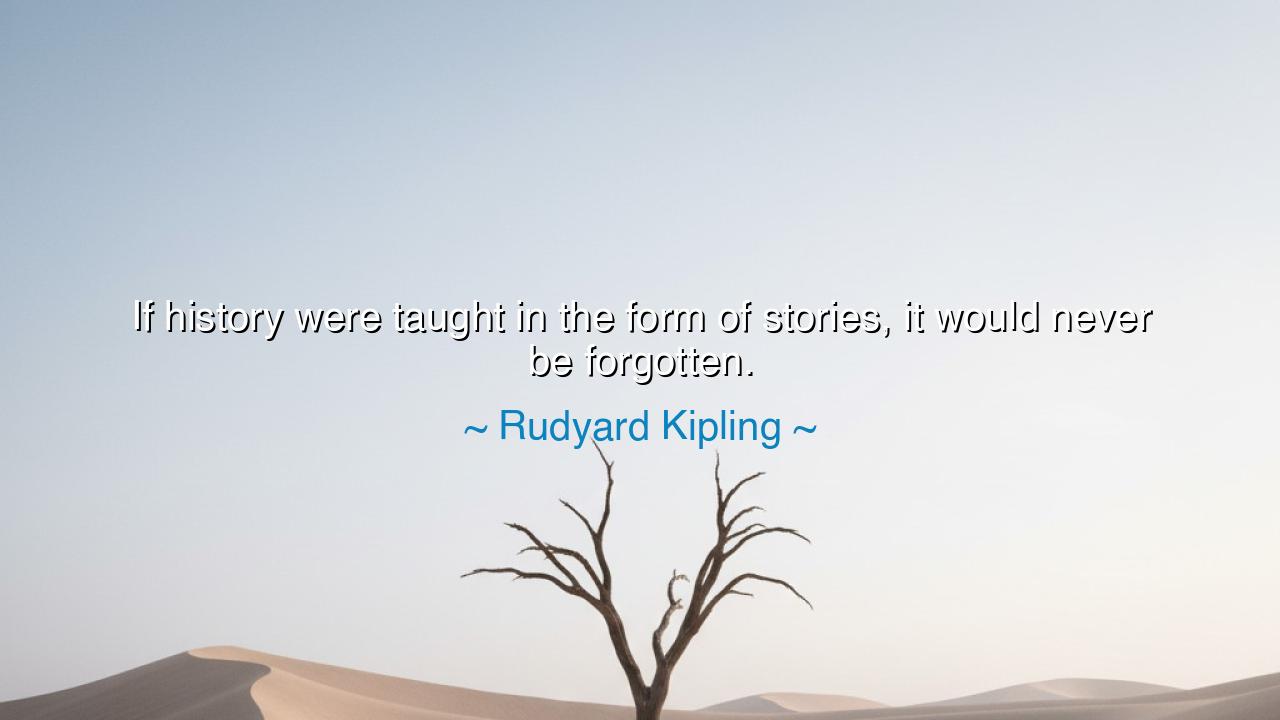
If history were taught in the form of stories, it would never be






The poet and storyteller Rudyard Kipling, whose words once stirred the hearts of empires and dreamers alike, declared: “If history were taught in the form of stories, it would never be forgotten.” In this sentence lies a wisdom both simple and profound — that the human soul does not learn through lists and numbers, but through the pulse of life itself. Kipling, a master of narrative, understood that storytelling is the oldest bridge between memory and meaning. Facts may fade, dates may be lost, but a story — once it enters the heart — becomes immortal.
To understand the origin of this thought, we must look to Kipling’s own world. He was a man who lived between nations — born in India, educated in England, and shaped by the vast, turbulent tide of the British Empire. Through his eyes, history was not an abstraction, but a living thing — full of kings and soldiers, merchants and wanderers, triumph and tragedy. He saw how history was taught in his time — cold, mechanical, stripped of emotion — and how the human spirit rejected it. For he knew that the lessons of the past were not meant to be memorized, but felt, experienced as living tales of courage, folly, and fate. And so, in his wisdom, he proclaimed that if history were told as it truly is — as a story of people, not just events — it would never leave the hearts of men.
In ancient times, the storytellers were the true keepers of history. Before ink and parchment, before chronicles and libraries, there were the bards, the griots, the poets — those who carried the past in their voices. Around the fires of Greece, Homer sang of Achilles and Odysseus; in the deserts of Arabia, the poets recited the deeds of their tribes; across Africa, storytellers preserved entire civilizations in rhythm and song. Their tales were not mere entertainment — they were the memory of the people, their victories and warnings passed from one generation to the next. And because these stories stirred the blood, they could not be forgotten. Kipling’s quote, therefore, is not merely advice for teachers — it is a call to revive the ancient way of learning.
Consider the story of Thermopylae, where a few hundred Spartans stood against a vast Persian army. To speak of it as a mere battle, a date in a book, is to drain it of power. But to tell it as a story — to describe the clash of shields, the courage of Leonidas, the roar of freedom in the face of doom — is to awaken something eternal in the listener. It becomes not just knowledge, but inspiration. The facts of the battle might be forgotten, but the spirit of it endures, shaping souls who hear it. This is the strength of storytelling: it transforms history from memory into meaning, from cold data into living truth.
Even in our modern age, this wisdom endures. A child may read that Nelson Mandela was imprisoned for twenty-seven years and later became president of South Africa — and forget the number. But tell that child the story of the man who walked free without bitterness, who forgave those who chained him, who turned suffering into strength — and the lesson will burn in their heart forever. Through story, we do not merely learn history — we live it, we feel it, we understand it in our bones.
Kipling’s quote is thus both a critique and a commandment. It challenges us to remember that the past is not a museum, but a mirror. When we reduce it to names and dates, we dishonor it; when we tell it as a story, we restore its soul. For stories awaken empathy — they make us see through the eyes of others, feel the heartbeat of lost ages, and recognize ourselves in those who came before. History, in its truest form, is not a study of what happened — it is a conversation between the living and the dead.
So, my children of the present age, take this lesson to heart: when you seek to understand history, listen for its story. Read not only the chronicles, but the voices hidden within them. Tell your children not only who did what, but why they did it, and what it cost them. Let your lessons breathe, let them speak. For every civilization that forgets its stories forgets itself. And every soul that learns through story gains not only memory, but wisdom.
Thus, as Kipling teaches us, storytelling is the flame that keeps history alive. It is the heartbeat of culture, the voice of experience, the light that guides the generations. Facts inform; stories transform. And when history is told as story — not merely written, but spoken, sung, and felt — it ceases to fade. It becomes eternal, living within us as part of who we are and who we are yet to become.






AAdministratorAdministrator
Welcome, honored guests. Please leave a comment, we will respond soon